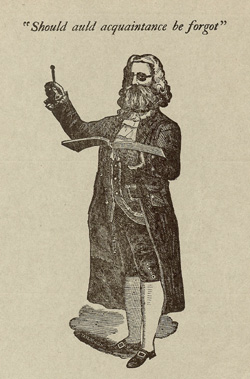
Father of American Choral Music
Born: Boston, Massachusetts, 7 October 1746
Died: Boston, Massachusetts. 26 September 1800
It has been suggested by some scholars that the frontispiece in the first Billings collection from 1770, The New-England Psalm-Singer, by Boston patriot and engraver, Paul Revere, shows Billings leading a singing session with a small group of men singers. If true, that engraving is the only likeness of this Father of American Choral Music.
The Musical Life of William Billings
Three questions might be asked about his music.
First, why is this first major American composer not as well known as other famous Bostonians, like Paul Revere and Sam Adams?
Second, doesn't he deserve to be better known?
Third, are present day performances appropriate
re-creations of the music by William Billings?The answer to the first question is he is not known as much because though he was a singing teacher and composer he spent more time in other jobs in order to maintain his large family, and was known in Colonial Boston primarily as a tanner. So he is not remembered by most historians. But Billings did know and was in agreement with the protests made by Sam Adams and others in Boston. Also, his friend, Paul Revere, designed the frontispiece illustration for the first Billings music collection, The New-England Psalm-Singer, published in 1770, and is the first major collection of choral music by an American composer. Therefore, he should be better known.
The second question may be answered with one word -- Yes! The main reason is that his music was the most respected in his time and can still have meaning and message for us today.
And to answer the third question -- Yes and No. Some performances strive to be as close as possible to the Billings singing style -- an emphasis on the tenor (main melody) and bass voices. But concerning tempo, the answer would be mostly -- No. The performances are often much faster than Billings intended often too much emphasis on speed singing, especially with Sacred Harp singers.
A bit of advice: slow down and savor the beauty of these fine tunes!
Billings was the best known and the most prolific composer of choral music in 18th century America.
He composed over one hundred pieces for chorus published in six collections between 1770 and 1794. The music includes: psalm tunes, hymns, anthems and set pieces.
His best known tune is titled, CHESTER (first published in 1770; with additional stanzas in 1778, and a new text not by him in 1786) -- it was sung in the first episode of the acclaimed HBO television series, JOHN ADAMS.
Here are two stanzas of the 1778 version:
Let tyrants shake their iron rod
And Slav'ry clank her galling chains,
We fear them not, we trust in God
New-England's God forever reigns.The foe comes on with haughty Stride;
Our troops advance with martial noise
Their Vet'rans flee before our Youth
And Gen'rals yield to beardless boys.Michael Medved, is one of the few historians to single out the importance of this Billings war song in his time and in our time as well. This is what he wrote in his book, The American Miracle (page 70):
This brief song unforgettably captures the unique combination of warlike determination and unshakable faith that characterized most of the American fighters and inspired twentieth-century composer William Schuman to craft his 1956 concert-piece, New England Triptych. The last section of the work, based on "Chester," brilliantly portrays the transition from church-like reverence to inexorable march, with "martial noise" and then to explosive amazement, overwhelming gratitude, and sheet delight at victory.
Musicologist Richard Crawford in The Core Repertory of Early American Psalmody (1984) wrote the following about this important patriotic song:
Set originally to a defiant patriotic text, CHESTER is remembered as an emblem of Americans' resistance of British domination before and during the War of Independence...Its current status as a recognizable piece of early Americana owes much to its fiery original text and to its appearance in William Schuman's New England Triptych (1956), composed for orchestra and for band the next year. Familiar to both choral directors and bandmasters, CHESTER today is more likely to be heard at a choral concert or a football halftime show than to be sung in public worship.
In 1786, the Billings text was replaced, probably because of such lines as: "New England's God forever reigns." The alternate text was not focused on wartime and written by Philip Doddridge.
This later version of CHESTER was recorded by
The Old Stoughton Musical Society, the oldest choral society in America (organized in 1786).The largest collection with Billings tunes published in the 19th century, was edited by musicologist,
Roger Hall:
The Stoughton Musical Society's
Centennial Collection of Sacred Music
(Boston, 1878/ Reprint, DaCapo Press, 1980).As the conclusion of his humorous anthem, MODERN MUSIC, the words say:
"Tis the part of the hearers to clap their applause."So let's clap our applause for America's
Father of American Choral Music -- William Billings!Here are a few performances of compositions
by William Billings:Anthem: "And I Saw I Mighty Angel" (1781) - Mahyla Marie
Anthem: ""As The Hart Panteth"(1770) - William Appling Singers & Orchestra
Patriotic Song: "Chester" (1778) - The Boston Camerata
Hymn: "Stoughton" (1770) - Old Stoughton Musical Society Chorus
(new edition by Roger Hall, 1986)
Select a tune to play or sing for National Carry A Tune Week including on the Billings birthday of October 7 and
read about Tune Week -- here
Memorial Plaque in Boston:
This plaque was placed on Tremont Street in Boston and reads:
One of America's earliest native born (Boston) composers who greatly enhanced a musical awareness within the colonies, by respected tradition, his final resting place is believed to be an unmarked grave within this area of the Common.
Presented on the occasion of America's Bicentennial and in conjunction with the 1976 National Convention of the AMERICAN GUILD OF ORGANISTS by the District of Columbia Chapter.
The presentation ceremony took place in 1976 at The Common and included the singing of the best known piece by Billings and the most popular war song composed by a native born citizen, CHESTER. It is ironic that Billings was remembered not by a Boston musician's organization but by an organist chapter from Washington. D.C.
On November 7, 1986 (exactly 200 years after it was organized), Roger Hall, Historian and Bicentennial Chairman of the Old Stoughton Musical Society, was a guest along with William Billings biographer, David McKay, on the popular classical radio program, "Morning Pro Musica," on WGBH-FM in Boston and hosted by Robert J. Lurtsema. There were several Billings tunes played and a portion of this radio program is available on this AMRC CD:
Best of William Billings (AMRC CD 0001)
To see the music titles on this CD -- click hereTen years later, in 1996, Roger Hall wrote a newspaper article about the 250th anniversary of William Billings' birth.The article was about Billings in Stoughton and the "sing" held in Boston.
Billings Bicentennial in Boston:
It was on a rain soaked Tuesday -- a day of mourning for an unfairly neglected American composer.On that day and evening a "sing" was held at King's Chapel (built in 1749) at the corner of Tremont and School Streets in Boston. It was held on September 26, the actual date when Billings died in 1800.
In observance of the 200th anniversary of his death, an exuberant chorus from points far and wide, including England, sang selected hymns and anthems of William Billings. The singing was organized by Billings 2000 (Sheila Beardslee Bosworth, King's Chapel Tuesday Recitals; Gina Balestracci and Roland Hutchinson from Garden State Sacred Harp Singers). A large volume of music was prepared by Roland Hutchinson.
In typical Sacred Harp fashion, various singers offered to lead the individual Billings pieces.
Neely Bruce came with his group of Sacred Harp singers from Wesleyan University in Middletown, Connecticut.
Roger Hall, a musicologist and former conductor of the Old Stoughton Musical Society Chorus, led two Billings tunes (STOUGHTON and MAJESTY), plus an original canon titled, "Come Let Us Sing," which Hall had composed with words from the last Billings tunebook of 1794.
In celebration of the 250th anniversary of the
William Billings singing school held in Stoughton in 1774
and the only one with all the pupils names listed in:
The new expanded 2nd edition of this book is now available in two different formats:
01: DVD-ROM:
Two books:
MAJESTY - William Billings and the Stoughton Musical Society
(80 pages)
SINGING IN STOUGHTON, 1762-1987
(104 pages)
Two audio albums:
BEST OF WILLIAM BILLINGS (20 audio tracks)
MAJESTY - Music by William Billings (16 audio tracks)
One hour video:
"A Stoughton Musicfest"
A history of singing in early Stoughton, including a short play: "William Billings Teaches A Singing School."
You can order the DVD-ROM at this webpage -- click here
02: PDF book:
Includes the William Billings family genealogy and facts and fiction about Billings and The Stoughton Musical Society. It also includes concert programs and other activities in Stoughton including the 1774 singing school taught by William Billingas. Also these texts and tunes:
Anthem: THE PLEASURES OF VARIETY- text by Billings, music:Roger Hall, 1980
Canon: COME LET US SING - text by Billings,
music: Roger Hall,1986
Fuging Tune: MAJESTY - music: William Billings, 1778
Hymn Tune: STOUGHTON - music: William Billings, 1770,
edited by Roger Hall, 1986
This has an 18th century text by Isaac Watts and it was premiered by the Old Stoughton Musical Society during its Bicentennial Concert in November of 1986.
The PDF book, MAJESTY, is available exclusively here
sent via email attachment.To order your copy of the new 2nd edition of the book (PDF) with a free audio file of the tune from 1770
for only $14.95, click the "Add to Cart" button.
After your have ordered your copy, for proper delivery
of the pdf book and audio file, send your email address to
See also this computer disc about the Massachusetts town
where William Billings taught a singing school in 1774 which is now the oldest surviving choral society in America:"DEDICATION" - Singing in Stoughton, 1762-1992
From the American Music Recordings Collection:
AMRC CD 0001: Best of William Billings -
music and radio interviews
This page is copyright by PineTree Productions, 1998-2025
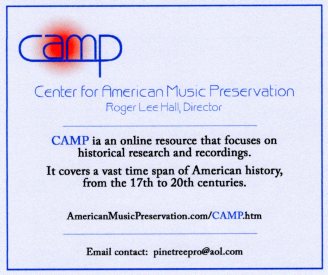
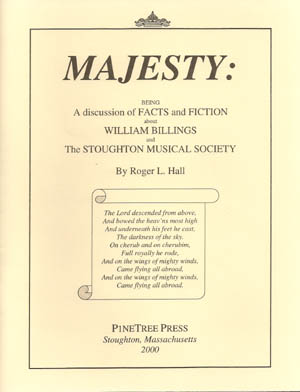


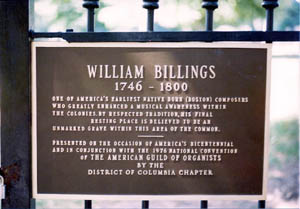
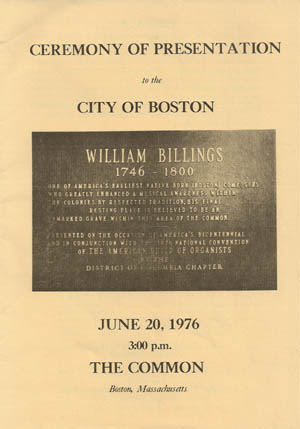
.jpg)
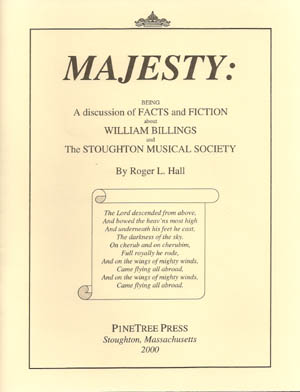
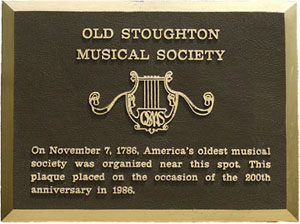
.jpg)
